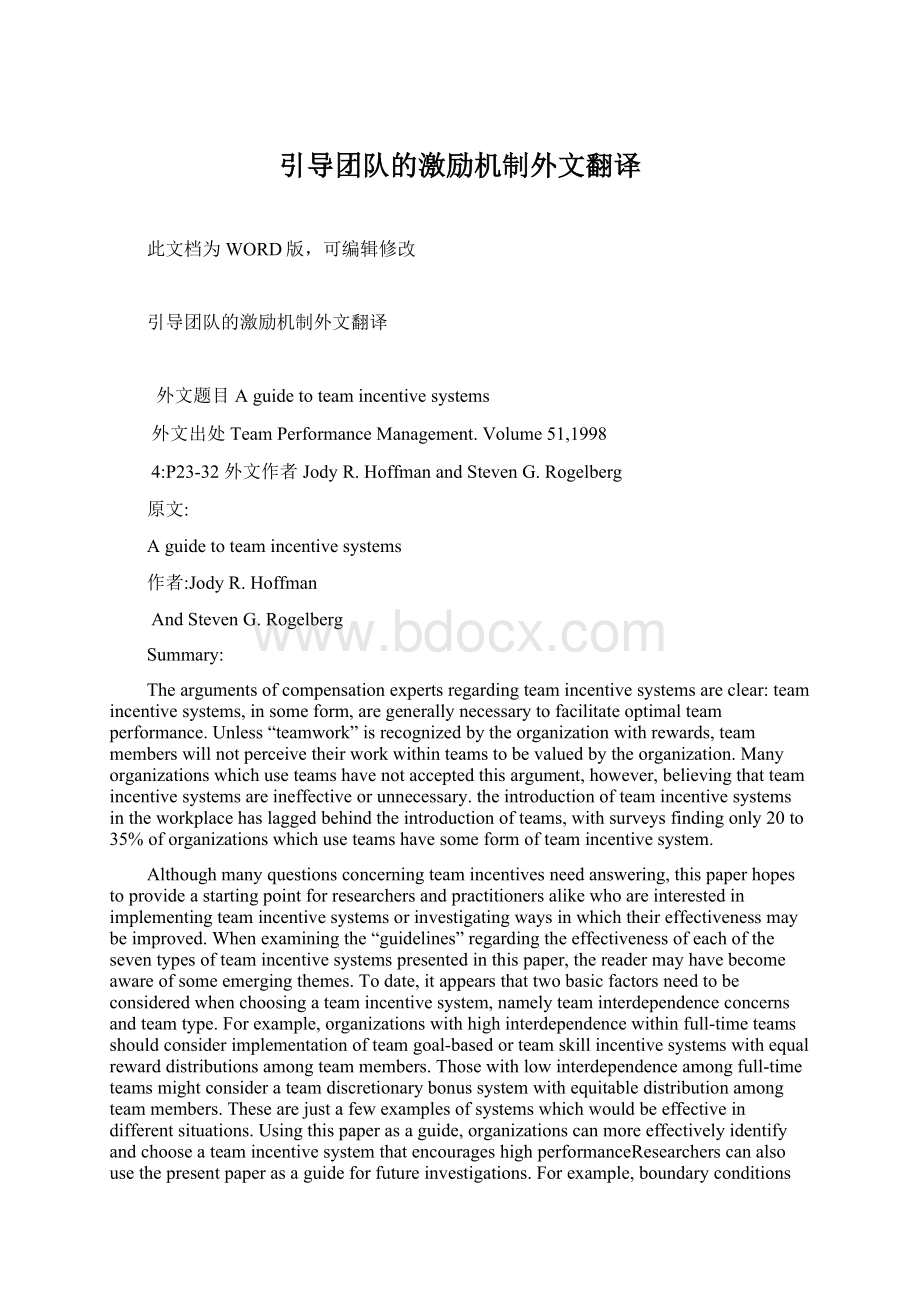引导团队的激励机制外文翻译.docx
《引导团队的激励机制外文翻译.docx》由会员分享,可在线阅读,更多相关《引导团队的激励机制外文翻译.docx(6页珍藏版)》请在冰豆网上搜索。

引导团队的激励机制外文翻译
此文档为WORD版,可编辑修改
引导团队的激励机制外文翻译
外文题目Aguidetoteamincentivesystems
外文出处TeamPerformanceManagement.Volume51,1998
4:
P23-32外文作者JodyR.HoffmanandStevenG.Rogelberg
原文:
Aguidetoteamincentivesystems
作者:
JodyR.Hoffman
AndStevenG.Rogelberg
Summary:
Theargumentsofcompensationexpertsregardingteamincentivesystemsareclear:
teamincentivesystems,insomeform,aregenerallynecessarytofacilitateoptimalteamperformance.Unless“teamwork”isrecognizedbytheorganizationwithrewards,teammemberswillnotperceivetheirworkwithinteamstobevaluedbytheorganization.Manyorganizationswhichuseteamshavenotacceptedthisargument,however,believingthatteamincentivesystemsareineffectiveorunnecessary.theintroductionofteamincentivesystemsintheworkplacehaslaggedbehindtheintroductionofteams,withsurveysfindingonly20to35%oforganizationswhichuseteamshavesomeformofteamincentivesystem.
Althoughmanyquestionsconcerningteamincentivesneedanswering,thispaperhopestoprovideastartingpointforresearchersandpractitionersalikewhoareinterestedinimplementingteamincentivesystemsorinvestigatingwaysinwhichtheireffectivenessmaybeimproved.Whenexaminingthe“guidelines”regardingtheeffectivenessofeachoftheseventypesofteamincentivesystemspresentedinthispaper,thereadermayhavebecomeawareofsomeemergingthemes.Todate,itappearsthattwobasicfactorsneedtobeconsideredwhenchoosingateamincentivesystem,namelyteaminterdependenceconcernsandteamtype.Forexample,organizationswithhighinterdependencewithinfull-timeteamsshouldconsiderimplementationofteamgoal-basedorteamskillincentivesystemswithequalrewarddistributionsamongteammembers.Thosewithlowinterdependenceamongfull-timeteamsmightconsiderateamdiscretionarybonussystemwithequitabledistributionamongteammembers.Thesearejustafewexamplesofsystemswhichwouldbeeffectiveindifferentsituations.Usingthispaperasaguide,organizationscanmoreeffectivelyidentifyandchooseateamincentivesystemthatencourageshighperformanceResearcherscanalsousethepresentpaperasaguideforfutureinvestigations.Forexample,boundaryconditionsfortheeffectivenessofdifferentteamincentivesystems,otherthanteaminterdependenceandteamtypefactors,mustbeidentifiedandexamined.Additionalfactorswhichmayaffecttheusefulnessofdifferentteamincentivesystemsinclude:
thecompositionofteams;organizationalcontextfactors;andteampressures,tonameafew.Researchersmayalsocontinuetogatherevidencefortheeffectivenessofteamincentivesystems,bydemonstratingthepositiveeffectsofsuchsystemsonteamperformanceandorganizationalproductivity.Astheuseofteamsgrows,suchevidencewillbecomeincreasinglyimportanttoensureselectionofanincentivesystemwhichensuresimalteamperformance.
SystemI:
teamgainsharing/profit-sharing
whenprofitorgainsharingsystemsareinstituted,itisarguedthatpayoutsshouldbefrequent,sothattherelationshipbetweenteamperformanceandtherewardisclear.
Anadditionalconsiderationwhenimplementingaprofitorgainsharingsystemconcernstherewarddistributionbetweenteams.Profit-sharingandgainsharingsystemswithequalpayoutsacrossteamsarethoughttoworkwellinhighlyinterdependentorganizations,whereinter-teamcooperationisimportant.Fieldresearchhasfoundsuchsystemsinstituteperceptionsthatdifferentteamssharecommongoals,thusimprovingcooperationamongteams.However,whenteaminterdependenceisnotafactorinorganizationalsuccess,gainsharingorprofit-sharingsystemswithequalrewarddistributionamongteamsmaybelessappropriate.Insuchcases,morecompetitivestructuresmayactuallyimproveteamproductivity.However,whenintroducingcompetitiveteamgainsharingorprofitsharingstructures,itisimportantthatteamsperceivesuchstructurestobeequitable;otherwise,feelingsofunfairnesswillresult.
Thenextissuetheorganizationmustconsiderconcernshowtodistributeincentivesamongteammemberswhoseteamsqualifyforcashrewards.Ifteammembersperformsimilarfunctions,oriftheirtasksarehighlyinterdependent,equalityofrewarddistributionhasbeenarguedtobemostlikelytoensureoptimalteamperformance.Astheneedforcooperationamongteammembersincreases,theneedforequalityofrewardsalsoincreases,althoughsomerecentlaboratoryworksuggeststhatthebeneficialeffectofsuchteamrewardsonperformancedoesnotcomefromanincreaseincooperativebehavior.Organizationsmaybeconcerned,however,thatdistributingrewardsequallyamongteammemberswillencourageslacking.Researchevidencedoesnotsupportthiscontention.If,however,teammemberinterdependenceisnotessentialforsuccess,orifsomemembersoftheteamclearlymakemoreimportantcontributionsthanothers,theteamincentivesystemrewarddistributionshouldreflectthisbybeingequitable.Indeed,equalityofrewarddistributioninexperimentalresearchhasbeenfoundtonegligiblyornegativelyimpactgroupperformancewhenteammembertaskswerenothighlyinterdependent,whileequitablerewardsresultedinhigherperformancelevels.Wheninstitutingadifferentialrewarddistributionsystem,however,theorganizationmustensurethatitispossibletoeffectivelymeasuretherelativecontributionsofteammemberstoteamoutcomesSystemII:
teamgoal-basedincentivesystems
Teamgoal-basedsystemeffectivenessisthoughttobedependentuponthe
typeofteamthesystemtargets.Thatis,thissystemisthoughttobemostappropriateforfull-timeteams,astheseteamsarethoughttobenefitmostfromclear,predeterminedperformancetargets,particularlybecausetheactivitiesoffull-timeteamsshouldbeclearlyspecifiedinadvance.Oneexceptionoccurswhensuchteamsfaceambiguoustasksinwhichpre-determinedgoalscanquicklybecomeobsolete.Additionally,thesesystemsmaybelessappropriateforpart-timeteamswhenmoretimeisspentonindividualtasks,asopposedtoteamtasks,assuchsystemsmaysendthemessagethattheteam’sworkishighlyvaluedandshouldbeemphasizedoverteammember’sindividualtasks.Finally,whendistributingrewardsamongteammembers,thesameconsiderationspresentedintheprevioussectionapplytothesesystemsaswell.
SystemIII:
teamdiscretionarybonussystems
Liketeamgoal-basedincentivesystems,itmaybethecasethatdiscretionaryteambonussystemsarebestforfull-timeteams,especiallywhenahighdegreeofcooperationisnotrequiredbetweenteamsinanorganization.However,wheninter-teamcooperationisnecessary,suchincentivesmaycreateconflictandresentment,decreasingateam’smotivationtoperformwell.Specifically,whenteamsmustcooperate,yetonlycertainteamsreceiverewards,thoseteamswhichdonotreceivesuchrewardsmaybecomelesscooperativeinthefuture.
Inthecaseofpart-timeteams,itisimportantthatateamrewardsystemnotbesoenticingthatitleadsteamdutiestoconflictwiththeteammember’sprimaryresponsibility,namelytheirindividualjob.Therefore,nomonetaryrewardsshouldbeofferedtopart-timeteamsunderthissystem.Finally,whendecidingwhethertodistributerewardsequallyorequitablyamongteammembers,onemustkeepinmindthesameguidelinesdescribedearlier,namelythedegreeofcooperationrequiredamongteammembers.
SystemsIVandV:
teamandteammemberskillincentivesystems
Theskilldevelopmentencouragedbyteamandteammemberskillincentive
systemscantakeanenormousamountofeffortandtime.Thus,ithasbeenarguedthatencouragingskillimprovementisreallyonlyappropriatewhenteammemberswillbespendingsubstantialamountsoftimewithinteams.Inhighlyinterdependentteams,suchsystemsencouragememberstolearneachother’stasks,thusfacilitatinghighperformance.Skillincentivesystems,aremostusefulforfull-time,permanentteams.Whenteammembersspendlittletimeinteamroles,focusinguponskilldevelopmentislikelytobeunnecessaryandundesirable.Thatis,encouragingemployeestodevelopteamskillswhichtheywillrarelyuseislikelytobeawasteofresources.Additionally,placingafocusonteamskilldevelopmentwilltakeatleastpartoftheteammember’sfocusfromotheraspectsoftheirjob,suchasachievingnon-teamrelatedskills.
SystemsVIandVII:
teammembergoal-basedandmeritincentive
Systems
Incentivesinteammembergoal-basedincentivesystemsmaybemonetary
ornonmonetary.Inthecaseofmonetaryrewards,variablepayandbonusesaremostcommon.Inthecaseofnonmonetaryincentives,achievementawardsaremostcommon.ateammembermeritsystemexists,wherehighperformingteammembersearnspecialrecognitiondinnerswhentheycontributeinanexemplarymannertoateam.TeammembermeritsystemsarealsofoundatBoeing’sCorinthplant.Unliketeammembergoalbasedsystems,nodefinitivelevelofperformanceexistswhichensuresthatateammemberwillreceiveanincentive.Instead,inteammembermeritincentivesystems,whenateammemberisdeemedbypeerorsupervisorevaluationtohavemadeanoutstandingcontributiontohisorherteam’sperformance,theteammemberisrecognizedwithmonetaryornonmonetaryrewards.Theserewardscantaketheformofsalaryincreases,bonuses,andnonmonetaryrewards.
TeamPerformanceManagement.Volume51,19984:
P23-32译文:
引导团队的激励机制
作者:
乔迪R.霍夫曼
斯蒂文G.罗格伯格
摘要:
专家门就团队激励机制补偿的争论是很清楚的:
在某种形式下,团队激励机制一般都是有必要的,它便于创造最佳团队绩效。
除非“团队精神”精神机构被公认为回报,团队中的成员将不知道他们的工作是被其他组织引导着。
许多组织中的团队并不接受这种观点,那么,对这种团队来说奖励制度就是没有效率的或者说是没有必要的。
因此,引进团队在工作场所中的奖励制度就要落后于队伍,据调查发现仅有20?
35%的组织,它们使用团